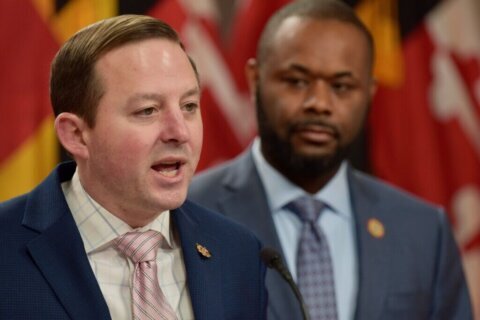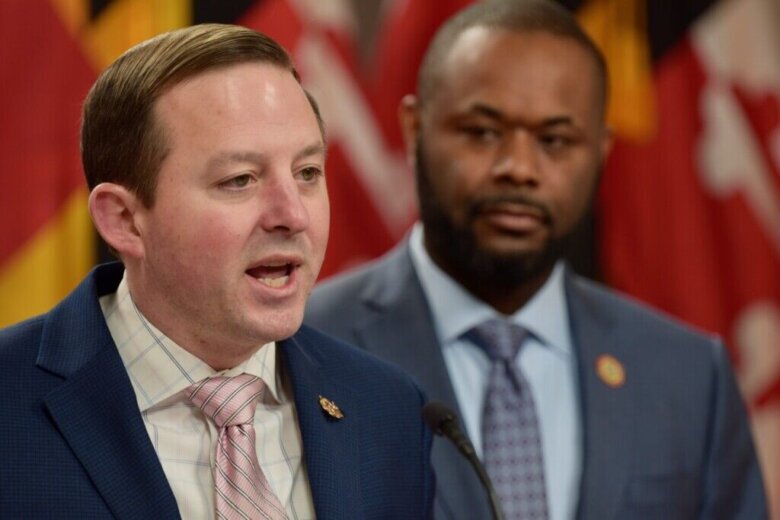This article was republished with permission from WTOP’s news partners at Maryland Matters. Sign up for Maryland Matters’ free email subscription today.

Senate President Bill Ferguson (D-Baltimore City) is not budging from opposition to broad-based tax increases or iGaming in the waning days of the 2024 session.
House and Senate leaders are expected to head to a conference committee next week to work out differences in the $63 billion fiscal 2025 spending plan. The biggest among them is a $1.2 billion tax, fee and gaming package cobbled together by House Democrats.
“We’ve been clear on what the Senate’s position was for months. Nothing changed on our end,” Ferguson told reporters during a Friday morning meeting. “I think that we’ve had cordial conversations. We’re in a different position on sort of the ideology around taxation when you don’t need it in the moment. And so, we’ll see.”
The Senate has not opposed all new revenues.
The budget passed in that chamber contained a number of targeted fee increases to benefit Shock Trauma or the 988 hotline, the state’s suicide and crisis lifeline. The package also contained two revenue recommendations from the Transportation Revenue and Infrastructure Needs (TRAIN) Commission to shore up the Transportation Trust Fund.
One of those imposes a new registration surcharge on electric and hybrid vehicles to bring owners in line with the owners of gas-powered vehicles who pay taxes on gas. Another would raise tolls on vehicles registered outside of Maryland and allow some of the toll revenue collected to go to the trust fund.
The House took different approaches to those recommendations, including lower registration fees plus a vehicle surcharge. The House toll plan calls for the Maryland Transportation Authority to disburse $75 million annually over 10 years to the trust fund — an amount tied to money used to help pay for construction of the Intercounty Connector toll road.
The House package also includes a worldwide combined corporate tax reporting requirement. Ferguson said he would not support the imposition of combined reporting even if it was limited to corporate entities with subsidiaries only in the United States.
Noting the Senate’s willingness to accept some targeted increases, Ferguson said there is some room for compromise, including a House plan to impose a fee on ride share services.
“That’s an area where we have not moved anything in the Senate, but I think we could consider that as part of the negotiation,” said Ferguson. “But you know, this is very targeted for specific purposes.”
Another line in the sand
Ferguson is adding to the list of things in the House budget he is determined to oppose.
On Wednesday, the House adopted an amendment that terminates the TRAIN Commission, the blue-ribbon panel tasked with modernizing the state’s Transportation Trust Fund. The state is facing a more than $3 billion shortfall in funding for roads and transit projects unless it finds more money.
House leaders say the spending plan they devised wipes out the deficit and eliminates the need for the commission to continue working through 2024. A House amendment to the budget terminates the panel.
“We don’t think we need two solutions,” said House Appropriations Committee Chair Ben Barnes (D-Prince George’s and Anne Arundel), in explaining the decommissioning of the panel. “We have one solution.”
On Friday, Ferguson asserted the amendment will not fly in the Senate.
“That’s not gonna happen,” he said.
No Blank Check for Old Hilltop
A plan for the state to revitalize Pimlico Race Course and run the Preakness and other horse racing will not come with a blank check, according to Ferguson.
“I don’t feel comfortable putting before the Senate anything that does have uncapped costs,” he said. “We have to be very responsible in our fiscal duties today and into the future. And so, anything that would move forward in the Senate would have to be positioned in a way that doesn’t have an uncapped amount that could go down the line for operating for an industry.”
The House of Delegates continues to work on a proposal that could finally bring revitalization efforts to the deteriorating Baltimore track that is home to the Preakness, the second leg of horse racing’s Triple Crown. That would include $400 million in state bonds for the track, including a proposed hotel and garage as well as a new state-of-the-art training facility.
Some skeptics are worried the plan has hidden costs that put taxpayers on the hook in future years.
Ferguson said such costs would not be welcomed in the Senate even in the name of saving the horse industry in Maryland.
“We support the industry a lot and we should,” Ferguson said. “There’s lots of public policy reasons why this is an important industry for the state of Maryland. But everything has a limit.”








